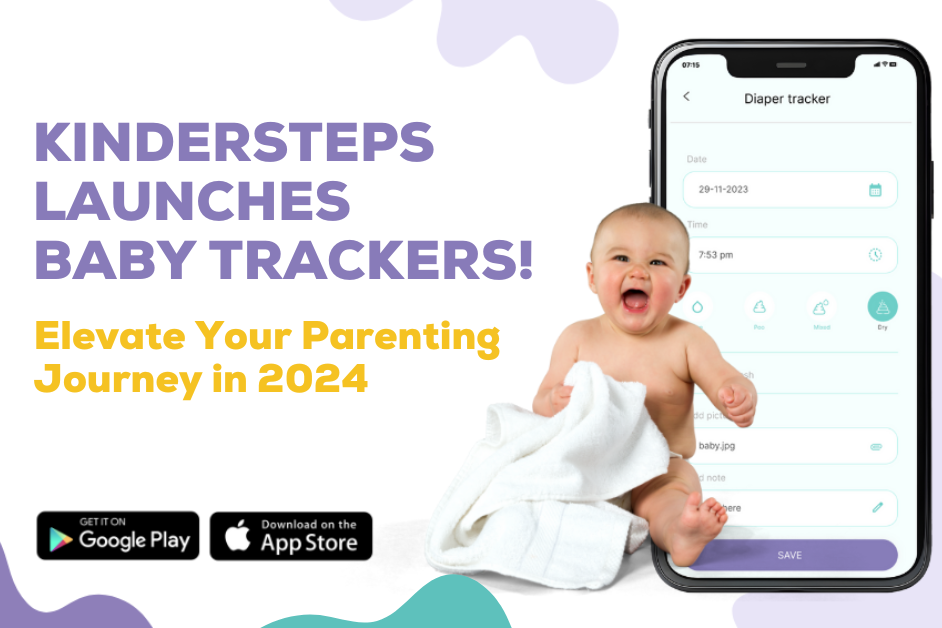At birth, the average baby's brain is around one-quarter the size of an adult's brain. It miraculously doubles in size in the first year. It grows to be around 80% of adult size by age 3 and 90% – virtually full-grown – by age 5.
Children gradually undergo various changes in terms of physical, intellectual, speech, and cognitive development. Distinct changes occur at a certain age of life. These changes are referred to as developmental milestones, which can help you in determining if your child is progressing at the appropriate rate. If these milestones are not met, it could indicate a developmental delay or a hereditary issue. The four stages of child development are as follows:
- Newborn: During the first two months of life, newborns respond spontaneously to external stimuli. They can observe close-up objects, move their head from side to side, turn towards the sounds and cry to express their need. At this stage babies learn emotions by observing their parents and caregivers, reacting to them when they coo, cry, smile, or yell.
- Infant: Infants at the age of three and six months may identify familiar faces, begin to talk, regulate their head motions. They can sit without assistance by six to nine months of age, bounce when held in a standing position, and respond to humans calling their names. Playtime and interactions with parents and family members through gestures provide key learning opportunities for the early development of a child. Children can point, crawl, pick up objects, and also stand with assistance by the age of twelve months and can also replicate sounds and movements.
- Toddler: Children between one and three years of age can stand alone, start to walk without assistance, begin to run, and climb stairs with tiny steps. Furthermore, they can wave hello and goodbye, grasp small things, learn to utter numerous words and even short phrases, and even follow simple directions.
- Preschool: Children between the age of three and five develop motor skills. They can throw and catch a ball, hop and skip, learn to clothe themselves, can easily speak, and draw appropriate structures such as a flower. Besides, they also begin to use the toilet and use the facility on their own.
- Respond to your baby. This is especially important if your child is unwell, hungry, agitated, or simply needs consolation. You aid your baby's brain development by responding in a caring and consistent manner.
- Good nutrition is essential for physical as well as mental development. Giving your child nutritious and healthful foods while restricting junk and processed foods from a young age can help them become smarter and create healthy eating habits, and also beneficial for their overall development.
- Read and discuss stories. Introduce them to books of the various genres from an early age, and read to them to develop their interest in it. Reading improves perspective and learning skills.
- Listen to music: Introducing kids to various genres of music at a young age helps them to develop language and literacy skills. Even learning to play a musical instrument can help students boost their learning ability and school grades.
- Parental stress: Stress is picked up by babies, so parents must be cautious. Parents who are stressed are more likely to be distant, are inconsistent or less engaged in meeting their child's physical and social-emotional needs.
- Lack of nutrition: Inadequate nutrition during a child’s first years threatens brain development. Children with poor nutrition are at risk for cognitive impairment, obesity, and other long-term problems.
- Lack of interaction: Lack of love, poor positive connection, and limited access to quality early learning experiences can all have a negative impact on a child's early brain development and, as a result, their long-term performance.
Parents and other caregivers may encourage healthy brain development in their children by talking to, playing with, and caring for them. They learn best when parents communicate and play together and build on their child's talents and interests. Understanding your child’s needs and responding sensitively fosters healthy brain development in their little one. You can find more helpful tips on the KinderSteps app, so download our app now.






.jpg?alt=media&token=166b64a9-274c-400c-95e4-baf0013e7e43)
